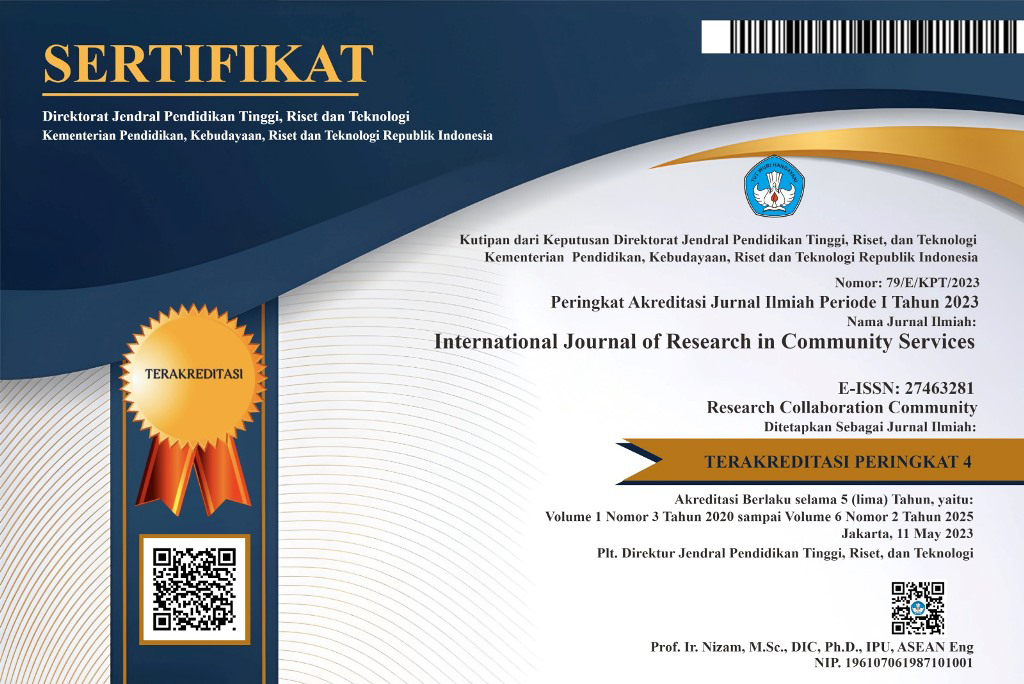Evaluating Anti-Corruption Education Implementation in Village Governance - A Case Study of PKM in Cipatujah District, Tasikmalaya Regency
Abstract
Community Service (PKM) is an effort to increase understanding and quality of the role of village heads and village officials in
carrying out government duties at the village level. PKM activities carried out in Cipatujah District, Tasikmalaya Regency, focus
on materials such as good governance, anti-corruption education, and the role of village heads as government administrators. The
evaluation results showed a significant increase in participants' understanding of the materials. The instructions provided also help
participants understand their roles and responsibilities as effective village leaders. These positive results indicate that PKM
activities have made a positive contribution in strengthening the role of village heads and village officials in village development.
It is hoped that the understanding and enthusiasm gained from this activity will continue in daily practice, creating a village that is
more advanced, empowered and has integrity.
Full Text:
PDFReferences
Temenggung, Y. A. (2016). Rural financial management in perspective law No. 6 of 2014 concerning the village. International
Journal of Social Sciences, 43(1), 42-54.
Revida, E., & Muda, I. (2017). Village governance with implementation of law number 6 of 2014 on the village and village
administration.
Widyawati, A., Wijayanto, I., Latifiani, D., Ra’uf, A. S., & Rosana, A. S. (2021). Assistance and establishment of an anti-
corruption legal clinic in Puguh Village, Boja District, Kendal Regency. Jurnal Dedikasi Hukum, 1(2), 164-177.
/ International Journal of Health, Medicine, and Sports, Vol. 3, No. xx, pp. xx-xx, 2023 5
Mukonza, R. M. (2013). Anti-corruption and local governance in Zimbabwe: a case of Chitungwiza Municipality. Journal of US-China Public
Administration, 10(1), 39-48.
Suyadi, S., Sumaryati, S., Hastuti, D., & Saputro, A. D. (2020). Early childhood education teachers’ perception of the integration of anti-
corruption education into islamic religious education in bawean island Indonesia. Elementary Education Online, 19(3), 1703-1714.
Tampubolon, M., & Rianto, B. S. (2022). Anti-Corruption Education: A Bottom-Up Approach in Purworejo Regency, Indonesia. Budapest
International Research and Critics Institute (BIRCI-Journal): Humanities and Social Sciences, 5(1), 3330-3336.
Dewantara, J. A., Hermawan, Y., Yunus, D., Prasetiyo, W. H., Efriani, E., Arifiyanti, F., & Nurgiansah, T. H. (2021). Anti-corruption education
as an effort to form students with character humanist and law-compliant. Jurnal Civics: Media Kajian Kewarganegaraan, 18(1), 70-81.
Musofiana, I. (2017). Anti-corruption education at an early age as a strategic move to prevent corruption in Indonesia. The 2nd Proceeding
“Indonesia Clean of Corruption in 2020".
Manion, M. (2004). Lessons for mainland China from anti-corruption reform in Hong Kong. China review, 81-97.
DOI: https://doi.org/10.46336/ijrcs.v5i3.627
Refbacks
- There are currently no refbacks.
Copyright (c) 2024 International Journal of Research in Community Services

This work is licensed under a Creative Commons Attribution 4.0 International License.
Published By:
IJRCS: Jalan Riung Ampuh No. 3, Riung Bandung, Kota Bandung 40295, Jawa Barat, Indonesia
Indexed By:

This work is licensed under a Creative Commons Attribution 4.0 International License.
View My Stats








